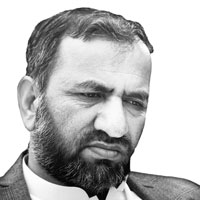Six U.S. troops were killed while on patrol in Afghanistan. It marked the deadliest day for American forces in nearly 18 months, and signaled that a resurgent Taliban was on the move in what was supposed to be the waning year of the war. Qari Mahajar, a member of the Taliban’s Kabul provincial military council, called it “a brilliant Christmas gift for the occupiers.”
Another two Americans and one Afghan soldier were injured on patrol.
The Taliban reportedly claimed responsibility for the attack, which left U.S. military officials scrambling to figure out how the Taliban could’ve taken out so many troops at once.
The American service members, who have yet to be identified, were killed by a suicide bomber on motorcycle who approached them while they were on patrol outside Bagram Air Base, 30 miles outside Kabul. Bagram is home to the bulk of the roughly 9,800 U.S. troops serving in Afghanistan.
A Taliban military source for Kabul told The Daily Beast, “Actually, we tricked American forces.” He said that a night before the Taliban struck, it had purposefully alerted U.S. soldiers to its presence in the area by setting something ablaze. “We knew that the next day the occupiers would come to search for us, so we left an Angel of Death behind.”
At the Pentagon, as leaders were preparing to leave for the holiday week, the mood was somber at news of the high death toll. The Christmas cheer quickly disappeared, replaced by shock over a loss that the U.S. rarely saw, even at the height of the war.
The U.S. military had no additional details of the circumstances of the strike, nor could it answer how U.S. troops could still be so vulnerable to Taliban attacks, particularly as forces do limited patrols and have buttressed security against insider attacks.
It is the deadliest day for U.S. troops since June 2014, when five were killed, four in the same incident, according to ICausalties, which tracks such statistics.
As of Dec. 18, 14 U.S. troops had died in Afghanistan this year, according to Pentagon statistics.
The attack was not only a personal blow for those leading the U.S. effort but a big symbolic win for the Taliban, which in the recent days has regained control of southern Helmand province.
In September, Taliban blitzed northern Kunduz province, which had been largely peaceful, as coalition-trained Afghan forces retreated. The U.S. military mistakenly attacked a Doctors Without Borders hospital there in an effort to push back the Taliban the following month; they killed 12 medical staffers and 10 patients instead.
That the Taliban increased its reached into areas once thought impenetrable, some believe, suggests the group is trying to showcase what little grip the government holds over the state.
Attacks like that on Kunduz and outside Bagram “demonstrates there is no safe haven for the government anywhere,” Marvin Weinbaum, scholar in residence at Middle East Institute, who worked extensively on Pakistan and Afghanistan, told The Daily Beast. “All of this is symbolic. If you can create insecurity, you begin to question the government’s ability to provide security anywhere, that is worth it itself.”
The Afghan security forces consist of roughly 350,000 people and yet have struggled to push back Taliban advances, even as they outnumber them. For the Taliban, the only forces able to stop their advances are foreign troops. Indeed, many in Afghanistan already speak of making plans for the country once U.S. troops leave at the end of next year, as is scheduled.
In October, the Long War Journal concluded the Taliban has control of 20 percent of the country and has influence in half of it. On Monday, the same publication said the group has control over nearly all of the south, an area the U.S. and allied partners spent more than a decade wrestling out of Taliban hands.
An Afghan military officer told The Daily Beast that the Taliban is making more military advances and is perhaps looking to move its Quetta Shura, or main governing body, to Helmand province. “Afghan forces will eventually retake those districts lost to the Taliban but it will badly damage their morale. We are suffering severe casualities every day and sometimes we think that it’s not worth it to protect such a weak and corrupt system,” the military officer said, referring to the Afghan government.
The war is supposed to be in its final days, with the government of Ashraf Ghani soon gaining total control of the state’s security. But the government increasingly faces internal political fissures, portending a post-American period wrought with divisiveness.
The U.S. military, for its part, said that Monday’s attack was not part of a broader Taliban effort but an “isolated” attack against soft targets.
“We’ve known for a while that they are striking at soft spots. Now they are doing it in isolation and for dramatic effort,” one U.S. defense official explained to The Daily Beast.
But the official could not say why U.S. troops—who are ordinarily protected by layer after layer of security measures, especially on a major base—were suddenly considered to be soft targets.
“Not everything is predictable,” the official responded.
Qari Mahajar, the Taliban member, called the carnage a “fantastic attack against the superpower.”
“The blood of the American is ideal blood,” he said.
This story had been updated.






